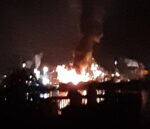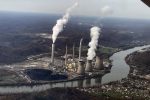|
||||||||||
|
Delayed protections are harming public health. More than 100 times per year, facilities using or storing toxic chemicals catch fire, explode, or release hazardous substances into the air. Exposure to these chemicals can cause immediate death or injury, reproductive, developmental, and respiratory damage, along with cancer and other harm to the nervous, endocrine, and cardiovascular systems. 177 million people (half the United States population) live close enough to facilities that could, at any moment, have a disaster and damage their health irreparably. Chemical disasters are a serious example of environmental injustice—the harmful impacts on health and safety from these disasters are not shared equally. Hazardous facilities like petroleum refineries, chemical plants, and petrochemical plants have long been disproportionately located in Black and Latinx communities and the chemical industry has consistently failed to address environmental racism. In response, communities across the country organized to protect their health and the Obama administration issued new protections in late 2016 — but the Trump EPA rolled them back and now stronger safety measures than ever before are urgently needed. Fortunately, the Biden administration has begun the process to finally protect our health by starting a new rulemaking. Join us in urging the administration to develop a robust, new Chemical Disaster Rule that ends the dangerous cycle of chemical disasters in our communities. A new Chemical Disaster Rule must advance environmental justice and protect public health and worker safety through five essential types of protection:
We need these protections. Once again, we must be organized and vocal in defense of our health and safety—because industries are unwilling to do what is necessary to protect the communities in which they operate and should not be allowed to set the terms for how they are regulated. Join us in calling on the Biden administration to create a strong new Chemical Disaster Rule by submitting a short comment. Take ActionPhoto of Belle, WV chemical plant explosion (December 8, 2020) courtesy of Melissa Smoot. |
||||||||||
Donate |
||||||||||

 Chemical disasters keep happening
Chemical disasters keep happening



